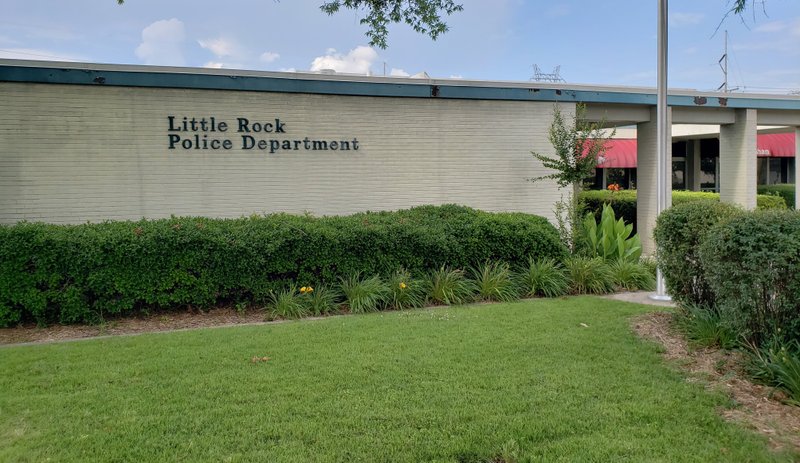After training, housekeeping, and months of delays, Little Rock's first Citizen Review Board is set up to conduct its first review.
The five-member board approved its bylaws at its second-ever meeting Wednesday. The panel received training from the Police Department at the start of the year and was set to hold its first meeting April 1, until restrictions related to the coronavirus pandemic put most city meetings on hold.
The panel of Little Rock residents, established by ordinance more than a year ago, will review police actions and investigations in the areas of corruption, discrimination and use of force.
From January to March, the group underwent about six four-hour training sessions with the Police Department, which covered policies, deadly force, racial profiling, diversity, and how the department conducts internal investigations, board chairman Derrick Smith said. He said the training provided a good foundation for the board's work.
"At the end of the day, if the board is responsible for reviewing investigations that the Police Department has conducted, it's good to get an understanding of how that process works, the things that they are reviewing and how they reach their own conclusions," Smith said. "I wouldn't say at this point anyone is an expert on Police Department policies, but at least we have an introduction and we have access to that policy."
[CORONAVIRUS: Click here for our complete coverage » arkansasonline.com/coronavirus]
City Attorney Tom Carpenter also trained the board on the Arkansas Freedom of Information Act last week. Smith said a representative from the FBI also has offered to provide training.
Mayor Frank Scott Jr., who was a proponent of the board's creation last year, announced in June that the panel's first task will be to review the police response to a Feb. 3 incident in which two white residents of the Capitol View/Stifft Station neighborhood confronted two Black politicians who were leaving a fundraiser that evening.
Darlene Herndon and Nicholas Castleberry -- who confronted state Rep. Vivian Flowers, D-Pine Bluff, and Ryan Davis, who at the time was running for a seat in the Legislature -- were charged with Class A misdemeanor harassment months after the incident.
Davis and Flowers requested that the review board look into the incident. Davis previously told the Arkansas Democrat-Gazette that he wanted the board to review the department policy that led to police arriving at the scene with their weapons drawn.
Laura Martin, community relations project manager for the Police Department, said she has notified city administrators that board members have completed their required training, but a timeline for them to formally receive from the city the complaint and the information associated with it that they will review has not been set.
According to the review board ordinance, the board has 60 days to conduct its review and make a determination once the complaint is received. The board may or may not hold a public hearing before announcing its decision, depending on the facts of the case, Smith said.
The city Board of Directors passed the ordinance establishing the review board in a split vote in July 2019.
Supporters of the ordinance said it could help foster community trust and ensure that police investigations are fair. Those who opposed it said the board's work would duplicate that of the Civil Service Commission, which deals with personnel policy and appeals for the police and fire departments, and expressed concerns that it could interfere with the due-process rights of officers.
The board's first two meetings, which took place in the past several weeks, occurred after a national wave of protests calling for racial equity in policing that came in response to the death of George Floyd, a Black man who died in police custody May 25 when a Minneapolis police officer knelt on his neck for several minutes.
Smith said the recent spotlight on criminal-justice changes might bring more attention to the board's work, but from his viewpoint, it's no more important than it was when he and the other members were appointed in December.
"I haven't really thought about whether the recent attention to these issues will result in more complaints," he said. "I think the population in general is interested in this issue, and so we could, but I think that there was some interest before recent weeks. At least that level will continue. ... People might pay more attention to what we do, but I think from our perspective, it's no more important today than it was six months ago. It's an important responsibility, and we're going to treat it as such."
Natalie James, a protest organizer in Little Rock, said the board is a good thing, but she feels the board's decisions should carry more weight than a recommendation when it comes to officer accountability, such as legal ramifications or an impact on their personnel file.
According to the ordinance and bylaws, the board has no decision-making teeth and only makes recommendations to the mayor and the Board of Directors.
"After being in it, and after being in the politics and protests, I feel that the review board should have a stronger voice and opinion than saying, here's my recommendation on this piece of paper that you can ball up and throw away," James said.
Martin said the city hasn't formally received any other requests of incidents for the review board to see.
James said the board should review the case involving Bradley Blackshire, a motorist who was fatally shot by officer Charles Starks in February 2019, and that of a Little Rock man who told TV station KARK last week that he lost his eye after an officer responding to a fight at a gas station on Baseline Road used a stun gun on him.
